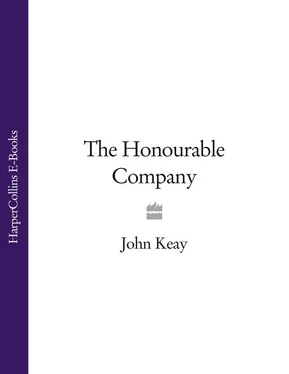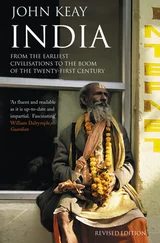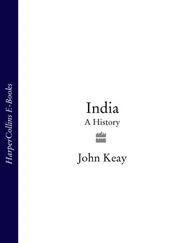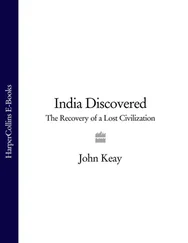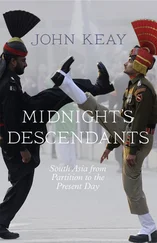1 ...7 8 9 11 12 13 ...35 ‘They had hardlie fiftie sound men in theire foure ships’ noted Edmund Scot who came aboard from the Bantam factory. His ‘extraordinarie great joye’ at the prospect of relief after nearly two years marooned in Java quickly evaporated. Middleton was again on the sick list and, as Scot knew only too well, Bantam was no place for convalescence. Here, unlike at the Cape, the sick died and the healthy sickened. An equatorial haze hung over the mud flats and marshes which passed for a coastline and across which the tide oozed its way towards the city’s brimming sewers. During the four hot months men longed for the drenching rains and during the eight wet months they longed for the unbearable heat. Neither was remotely agreeable and even the nights brought no relief. Sweat seeped from ever-open pores, soaking bedding and clothing alike and blistering the skin with prickly heat. This did not deter the mosquitoes which rose in clouds from the marshes and sought out the palest flesh on offer. Malaria was unavoidable; so was dysentery. Typhoid came and went – only to be replaced by cholera. Within a matter of decades Bantam would be abandoned to the undergrowth and insects which to this day smother its unhappy ruins.
To men who had already spent nine months at sea it can have been little comfort to be told that their only hope of survival lay in again putting to sea as quickly as their business permitted. Yet Scot’s account of life at Bantam left them no choice. He had been one of eight factors left behind by Lancaster. Now he was one of two. (The other survivor, Gabriel Towerson, must have been blessed with a constitution of concrete for he would outlast all his contemporaries only to succumb, twenty years later, to the cruellest cut of all.) Times had been hard in Bantam. The factory, a compound consisting of a timber warehouse with adjoining living quarters surrounded by a high palisade of stakes, had been in a state of siege for most of the two years, Scot’s visit to the Red Dragon being only his second outing since the previous summer. ‘My feare was so great’, he explained, ‘because I thought all would be burnt before I could come back againe.’ Indeed there had been so many attempts to set the place on fire that he had become quite paranoid on the subject.
Oh this worde fire! Had it been spoken in English, Malay, Javan or Chinese, although I had been sound asleep, yet I should have leapt out of my bedde, the which I had done sometimes when our men on watch had but whispered to one another of fire; insomuch that I was forced to warn them not to talke of fire in the night except they had great occasion.
Sometimes it was just the danger of those general conflagrations that raged in all the wood-built cities of the tropics whenever a dry wind blew. At other times it was more personal. In the dead of night a shower of flaming arrows would come arcing over the stockade or a gang of Javanese arsonists would rush the gate. Once some Chinese managed to tunnel under the fence, across the compound, and up under the floor of the warehouse. Here their attempt to burn a hole through the floorboards went disastrously wrong. There was an almighty blaze and although the thieves got away with nothing, precious bundles of calicoes were destroyed. The stench of burnt pepper hung about for days.
Hearing their story Middleton must have found it hard not to sympathize with the beleaguered Bantam factors. In the suffocating heat of their West Javan hell-hole they fought their fires and buried their dead, filled their ledgers and said their prayers, all with a clear conscience and three cheers for the Company. Yet they were no innocents abroad and, if one may judge by their penal code, their ideas of civilized conduct fell short of those of their Javanese hosts. In an otherwise beguiling narrative Scot cheerily announces the capture of the Chinese tunnellers. Instantly the Honourable Factors of the Worshipful Company turn demon torturers. Out come the pincers and the bone screws. The smell of burnt pepper gives way to that of burnt flesh. They collect white ants to tip over open wounds and at last despatch their victims with a brutality worthy of Tyburn. ‘Now a worde or two concerning the Dutch shipping,’ continues Scot’s breezy narrative, ‘and shortly after into fyre and troubles againe.’
At the root of these troubles lay the failure of the Javanese to distinguish between Dutchmen and Englishmen. The former, now organized into the United East Indian Company (V.O.C.) with Bantam as its eastern headquarters, were a formidable presence. Their fleets shuttling between the Moluccas and Europe regularly disgorged into the city unruly mobs of red-faced sex-starved sailors while their merchants became increasingly high-handed in their dealings with the local authorities. The Dutch were deservedly unpopular and this unpopularity rubbed off on to the English. Hence, thought Scot, the endless fires and raids.
But at this stage there could be no question of denouncing the Dutch. Their presence was actually some comfort to the English. ‘Though we were mortal enemies in our trade’, wrote Scot, ‘yet in other matters we were friends and would have lived and died for one another.’ In Europe the English had championed the cause of Dutch independence; there was no shame in Englishmen now accepting a measure of Dutch protection in the East. All that was needed was some way of showing the Javanese that there was a difference. A solution of dazzling simplicity was proposed by Gabriel Towerson. They would mount a parade. Mastering his ‘fear of being counted fantasticall’ Scot agreed and, as 17 November approached, ‘the which we held to be our coronation day’, the factors and their servants ‘suited ourselves in new apparel of silk and made us all scarves of red and white taffeta (being our country’s colours) and a flag with the redde cross through the middle’.
Our day being come, we set up our banner of St George upon the top of our house and with drum and shot we marched up and down within our grounde; being but fourteen in number, we could march but single one after another, plying our shot and casting ourselves in rings and S’s.
The commotion duly attracted a goodly audience to whom it was explained that they were celebrating their Queen’s coronation (‘for at that time we knew no other but that Queen Elizabeth was still lyving’). In the afternoon Scot took a calculated risk and dismissed his whole company with instructions to roam the town. ‘Their redde and white scarves and hatbands made such a shew that the inhabitants of these parts had never seen the like.’ And to every enquiry as to why ‘the Englishmen at the other factory’ were not also celebrating, it was emphatically pointed out that ‘they were no Englishmen but Hollanders and that they had no king but the land was ruled by governors’.
Ever after that day we were known from the Hollanders; and manie times the children in the streets would runne after us crying ‘Oran Engrees bayck, Oran Hollanda jahad’ which is ‘The English are good, the Hollanders are nought’.
Vigilance was necessary but Scot and Towerson were no longer held responsible for the riotous conduct of every drunken Dutchman. They were free to sell their calicoes and, blissfully unaware of trends in the London market, to amass substantial stocks of pepper.
These stocks, and the need to withdraw from Bantam as quickly as possible, soon persuaded Middleton to ignore the Company’s instructions once again. Within two months the Hector and the Susan were loaded with pepper and sent to England. Even this speedy turnaround proved too slow for most of the sick, the Hector losing its captain, its master and its master’s mate not to mention ‘common men’. Matters stood no better on the Susan and after recruiting local seamen both ships were still woefully undermanned. They left Bantam on 4 March 1605. What happened thereafter is unrecorded. We know only that the Susan with a crew of forty-seven was never seen again; and that of the Hector’s crew of fifty-three only fourteen reached the Cape, where they were discovered ineffectually trying to beach their ship to save her cargo.
Читать дальше
